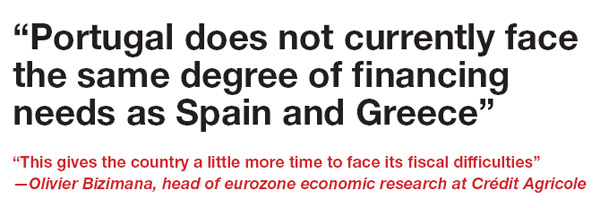Country Report: Portugal
By Denise Bedell
Portugal has been hit hard by the general uncertainty over the eurozone’s future, but its prospects are outshining some of its neighbors’.

It may still be laboring in Greece’s shadow, but Portugal is dealing with the need for strict austerity measures to bring down its deficit and is facing its troubles head-on. Its efforts are paying off: Some economic signs are improving, and investors are taking notice. Analysts believe that if the country stays on track, there is a good chance it will meet deficit reduction forecasts, stay out of recession and gradually rebuild investor confidence.
Clearly some major issues remain to be addressed—including an elevated budget deficit and highly leveraged corporates that will face much-widened spreads as they look to refinance this year. But two key factors in Portugal’s favor are that its banking sector is stable and first-quarter GDP was stronger than expected. Portugal’s banking sector has minimal exposure to the subprime products that triggered the recent global meltdown. In the corporate sector, a good portion of debt is still sourced from the domestic lending markets, which also bodes well for the country. Partly as a result, the counterparty risk faced by many US and other European companies at the height of the financial crisis is not a critical issue for companies in the country. In addition, Portuguese banks have generally acted as intermediaries between the corporate sector and international investors, providing an extra security layer for investors and corporates alike.
Another factor in Portugal’s favor is the clear, concise detail that the government has provided on how it will implement austerity measures to deal with the fiscal crisis. Douglas Renwick, associate director in the sovereign ratings team at Fitch Ratings, explains: “The austerity measures are important to restore sustainability. Equally important is the fact that these measures are implemented in a vigorous way.”
The government can choose to act in two ways, Renwick says: “You can either announce a vague consolidation program of efficiency savings, or you can outline exactly what you are going to do and when, and provide concrete figures. The market reacts better to the latter because then it can do its own analysis. The fact that Portugal has taken decisive steps to cut the budget should increase confidence in the government first, which should reduce the cost of borrowing. Then this should increase confidence in the economy more generally.”

 |
|
Bucco: Surprised by Portuguese |
Measures already announced include increasing the value-added tax by one percentage point to 21%, cutting wages for public employees and initiating a higher-earner income tax surcharge. More measures are expected to be announced in the coming weeks, after the European Commission released a report in early June urging the country to take additional steps to reach its deficit reduction targets. The EC report said: “The outlined revenue performance and expenditure containment may be difficult to attain on the basis of the announced measures. There is the risk that a lower-than-assumed GDP growth would dampen revenue growth and jeopardize the fall in the expenditure-to-GDP ratio.” Portugal plans to reduce the deficit, which was 9.4% in 2009, to 7.3% this year and 4.6% next year.
Tullia Bucco, a vice president and economist at UniCredit, says: “We should see some further announcements with respect to additional spending cuts in the coming weeks from Portugal to address the European Commission concerns.”
Not Alone
Portugal is hardly alone in breaching EU rules that set a budget deficit cap at 3% of GDP. Almost all EU countries breached the 3% deficit-to-GDP cap at some point in 2009, although a few, including Sweden, have already brought it back down. But there is a big discrepancy between the highest euro area deficits—in Portugal, Spain and Greece—and the euro area average of 6.3% at year-end 2009. Of the three countries with the highest deficit-to-GDP, Portugal had the lowest. The others passed 10% by the end of 2009.
There are also considerable differences in underlying economic conditions. Portugal is benefiting from stronger-than-expected first-quarter GDP growth. Bucco says: “Portugal was one of the countries which reported very strong GDP growth for the first quarter this year. But it was somewhat surprising that, following the stronger-than-expected GDP outcome, the government did not change the forecast for the full year.” GDP would have to stagnate throughout the rest of the year to yield the originally forecast average. However, a large part of the stronger GDP outcome derived from government spending, which is something that cannot be sustained going forward if the government wants to meaningfully reduce the deficit-to-GDP ratio.
Olivier Bizimana, head of eurozone economic research at Crédit Agricole, adds: “Portugal does not currently face the same degree of financing needs as Spain and Greece. This gives the country a little more time to face its fiscal difficulties.” Indeed, Portugal easily refinanced its only bond redemption this year—a €5.6 billion ($6.9 billion) bond that was due in May. Bizimana adds: “However, the high level of private indebtedness and the wide competitiveness gap will weigh on its growth performance in the coming years.”
Enhancing competitiveness is critical, Bucco adds: “It is essential that Portugal improve its competitiveness, and in this respect some of the austerity measures that have been announced address the issue. But the government could do more. More-aggressive wage cuts, for example, could be beneficial.”
The scope for further cuts may be limited, though, because Portugal had already imposed some measures between 2005 and 2008 to contain wages. As a result, the government refrained from introducing additional cuts in the original austerity measures. In its second round of cuts, announced in May, it called for just a 5% reduction in civil servants’ wages.
According to Bucco, a more aggressive stance could be warranted, as wage cuts are among the most efficient mechanisms to make the country more competitive against external markets, thus stimulating internal growth and reducing imports.
One of the biggest issues for Portugal is trade. The country has had below-EU-average exports-to-GDP ratios throughout its history within the EMU. In 2008, for example, Portugal’s exports-to-GDP ratio sat at 33%, compared with an EU average of more than 40%, according to research from Standard & Poor’s. This is far from the lowest average within the EU, but it nonetheless has taken a toll on the country’s growth and budget deficit.
“Portugal needs to boost exports, which must become one of the growth engines for the economy,” says UniCredit’s Bucco. “They have made some efforts toward diversifying export markets—for example, to Angola. But it is clear that Portugal still relies heavily on its exports to Spain, and obviously Spanish growth will be quite subdued in the coming years. So further diversifying export markets is a priority for Portugal.” This is also critical to rebalancing the country’s international investment position (IIP is the ratio of gross external debt to gross external surpluses), which stands at 110%—the highest in Southern Europe. Boosting exports could help bring this figure down closer to EU averages.
Equally a problem is that most of Portugal’s trading partners—including Spain, Germany, and France—are themselves implementing spending cuts. With public finances cut, this will slow domestic demand, thus reducing imports and affecting trade figures across the eurozone. According to research by Eurostat, the EU statistical agency, and Standard & Poor’s, more than 70% of Portugal’s exports go to eurozone countries. Outside the eurozone, the US is its largest trading partner.
The biggest risk, according to Crédit Agricole’s Bizimana, is that fiscal austerity measures throughout the eurozone will not only weigh on growth but in turn further worsen public finances. He explains: “By forcing governments to prematurely implement corrective budgetary measures, financial markets will have completed a vicious circle.” High risk premia will lead to premature austerity measures, which will result in increased economic slowdown. That will have a negative weight on the fiscal balance and will increase uncertainty over the effectiveness of austerity plans, which may encourage governments to look at greater austerity measures, thus feeding back into the negative loop. He notes, however, that this is more of a risk for Spain and Greece.
Downgrades Take A Toll
Portugal has been hit by ratings downgrades in recent months by all three major ratings agencies. In addition, the country has suffered under a shared spotlight with Greece, with media and analysts pointing to the potential for Greek contagion to further affect the country. In some senses, the attention is unjustified. As Fitch’s Renwick notes: “Evidence that Portugal is entering a sustained recovery and that budgetary targets are being met, along with further structural reforms to enhance the productivity and competitiveness of the economy, would ease downward pressure on the rating.”

However, the combination of the relatively low annual growth forecast, the downgrades and Portugal’s association with Greece have clearly generated some worries for investors. They have brought into sharp focus the fiscal vulnerability of the country and triggered a further widening of spreads on Portuguese bonds. However, sovereign investors are clearly starting to differentiate between Portugal and Greece. As one analyst has pointed out, there is little chance now that Portugal will be shut out of the bond markets.
Indeed, when Portugal came to market with a €500 million T-bill transaction in May, demand came in at almost double supply. The bond yielded 2.95%—well below secondary market spreads on comparable issues just before launch, which hit a high of 4%. There is still clearly a demand for Portuguese bonds; investors simply want an additional risk premium for taking them on.
Businesses Pay the Price
Portuguese corporates are also paying the price of the concerns over the country’s finances. Many companies have built up significant leverage over the past decade, so the widening spreads on sovereign debt—which is pushing out corporate spreads—could present a problem over the coming year as companies look to refinance maturing debt.
In addition, there is a clear need for a general deleveraging of corporate balance sheets. This is a worldwide trend, but one that has not taken hold quickly enough in Portugal, according to Bucco. Last year saw little significant change in the leverage picture of Portuguese corporates, so the coming months will determine whether companies are taking to heart the need to reduce debt and strengthen balance sheets. Companies in Portugal clearly need to set out their own austerity measures and look at ways to more efficiently use their existing cash.
Corporates are undergoing some deleveraging, but what will be most important is the speed at which this process unfolds. The necessity for Portuguese companies to up the pace of deleveraging is certainly one of the major issues the country must face, and, as one analyst says, “It cannot come too soon in order to restore investor confidence.”
One thing that should help Portugal going forward is its political will to improve the economic picture. Renwick notes: “There is a broad consensus between the two leading parties on fiscal consolidation. The government has had the support, either implicitly or explicitly, of the opposition on budgetary matters throughout this situation. In the most recent budget revision, the opposition voted with the government, and that is encouraging. We do not see any major political fallout as a result of the fiscal problems in Portugal.”
Political infighting could have been deadly to chances not only of making necessary changes but also of shoring up international investor confidence. By facing up to the country’s challenges and acting in harmony, Portugal’s political leaders are helping to rebuild confidence.
Pedro Vieira, managing partner at law firm Linklaters in Lisbon, says that from a foreign investment perspective, Portugal is ahead of its peers in some respects. “There are a number of long-term factors which need to be addressed, such as the competitiveness of our economy. But we are well in advance of other European countries in addressing certain issues—including social security and labor law reform,” he says.

 |
|
Vieira: Portugal is ahead of its peers |
Vieira points to the overhaul of Portugal’s social security system three years ago, which included restructuring pensions, rebalancing programs for civil servants and the private sector and extending the retirement age. Last year Portugal added flexibility to its labor laws—for example, by increasing maximum work hours and simplifying procedures for reducing staff—to provide a more competitive environment for business. He says: “We have addressed issues such as bureaucracy and reduced the red tape involved in setting up and conducting business. We have a much more business-friendly environment now.”
Foreign direct investment has also benefited from the fact that the fiscal austerity measures have generally not been aimed at businesses. For example, tax increases have not had a huge impact on corporate taxation rates, although the most recent measures announced do include a small tax hike on corporate profits.
In the end, however, boosting Portugal’s attractiveness to foreign investment will require the country to prove its growth potential and present a solid fiscal picture. Companies want to know that they can make profits by entering a country. In the medium-to-long term, a stronger, more resilient economy will bring in investors. In the near term, worries about Europe’s sovereign crises will indubitably restrain Portugal’s ability to attract new foreign investment.
Vieira says: “Foreign investment will occur when it is felt that the economy will provide a strong platform for the markets.”



